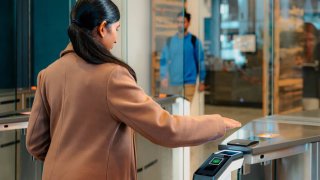
- Amazon is introducing a version of its palm-scanning technology for businesses.
- The company is pitching the service as a way for employees to swipe their hand to enter an office or to access sensitive data.
- The Amazon One payment system is used in Amazon's grocery stores.
Amazon is expanding its palm-scanning technology beyond grocery stores and is rolling out a version that's designed for the business world.
Amazon One Enterprise repackages the company's palm-based payment system as an authentication tool that lets corporate employees swipe their hand to enter an office or access sensitive information like financial data or human resources records.
Companies already signed up for the biometric technology include IHG Hotels and Resorts, turnstile manufacturer Boon Edam, and Kone, an escalator and elevator provider. Amazon didn't disclose pricing for the service, which is available in preview in the U.S. starting Monday.
We've got the news you need to know to start your day. Sign up for the First & 4Most morning newsletter — delivered to your inbox daily. >Sign up here.
Amazon is pitching the service as a cheaper and more secure solution for enterprises compared to traditional security and authentication tools like fobs, badges, or passwords.
"Businesses appreciate the privacy and convenience for their users, who can access physical locations and software assets with just a hover of their palm," said Dilip Kumar, a vice president who oversees Amazon Web Services Applications, in a statement.
Amazon debuted its biometric payment system in 2020. The technology was originally conceived as a way for shoppers to pay for purchases by swiping their hand. It's been deployed in Whole Foods grocery stores, some Go convenience marts and several Fresh supermarkets. Sports and entertainment venues have also adopted the technology, as have some Panera Bread restaurants and a handful of Starbucks locations.
Money Report
Advocacy groups have criticized the service over privacy and security concerns, arguing it leads to increased surveillance. Amazon says palm recognition is more private than other biometric systems "because you can't determine a person's identity by looking at an image of their palm." The company also claims it doesn't capture purchase data from scans collected by non-Amazon stores.
By reimagining Amazon One for enterprises, the company is following a playbook it's adopted elsewhere. Earlier this month, Amazon debuted Astro for Business, a version of its household robot that it's framing as a roving security guard for businesses.
WATCH: Black Friday was biggest ever for Amazon






